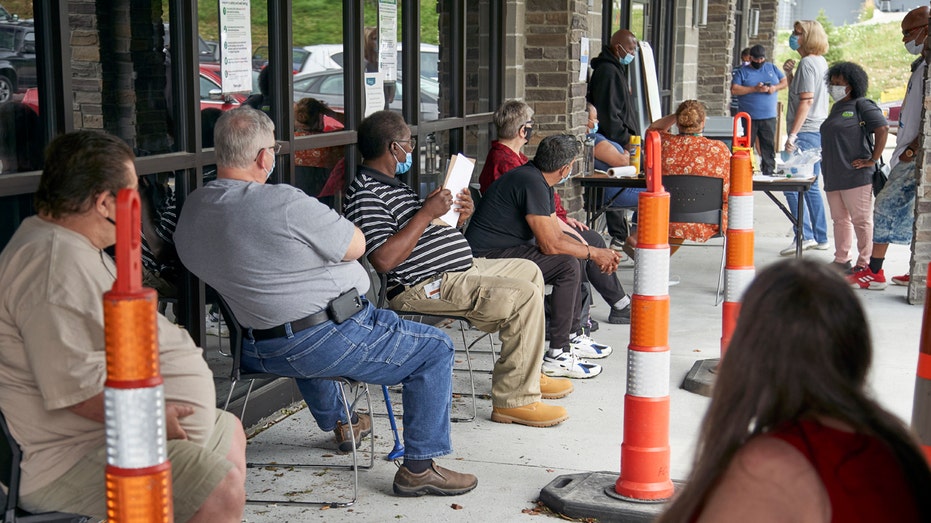$26B will be lost to improper CARES Act spending: Study
The loss is equal to unemployment spending for all 50 states in 2019
An estimated $26 billion will be lost to improper spending of Coronavirus Aid, Relief and Economic Security Act unemployment benefits, a new study shows.
The entire U.S. unemployment system, by contrast, paid out slightly more than $26 billion in 2019, according to research, which cites estimates from the Department of Labor's Inspector General, from The Foundation for Government Accountability, a public policy think tank based in Naples, Florida.
"This is a program that's only existed for a few months, and the amount of potential fraud and waste is 10 times what the entire 50-state system sees [annually], so the $26 billion is ... about the same as what the entire nation generally spends on unemployment for an entire year," Joe Horvath, an accountability foundation policy fellow, told FOX Business.

Job seekers exercise social distancing as they wait to be called into the Heartland Workforce Solutions office in Omaha, Neb., Wednesday, July 15, 2020. (AP Photo/Nati Harnik)
The word "improper" refers to "overpayments, underpayments and fraud" under the Department's guidelines. Each U.S. state has different rules and formulas for determining who gets unemployment benefits and how much they are eligible for.
"Sometimes they just don't get that right," Horvath said.
UNEMPLOYMENT FRAUD SPIKES ACROSS US AS STATES RUSH TO PROCESS TIDAL WAVE OF APPLICATIONS
Unemployment benefit fraud, according to the Labor Department, includes knowingly submitting false information, continuing to collect benefits even when ineligible, being unavailable to work while certifying for benefits or intentionally not reporting wages or while receiving benefits.
Additionally, a Nigerian fraud ring may be responsible for stealing an estimated $650 million in estimated unemployment funds after targeting Washington state, according to the foundation.
'MASSIVE' UNEMPLOYMENT FRAUD ENTERPRISE TARGETING EXPANDED BENEFITS BUSTED IN APRIL
Horvath said instances of fraud related to CARES Act benefits come from a combination of "difficulty to manage the program inherently but also the incentive baked into the cake that a really unfortunate set of circumstances in the past few months allowed to happen."

A man walks past a retail store that is going out of business due to the coronavirus pandemic in Winnetka, Ill., Tuesday, June 23, 2020. (AP Photo/Nam Y. Huh)
"Unfortunately, it was kind of a perfect storm for fraud [in which] states had a huge backlog, they've never done something like this before, there weren't proper safeguards in place, and the money was such that there was a huge incentive to perpetrate fraud," he said.
TREASURY SENT 1 MILLION DEAD PEOPLE STIMULUS CHECKS WORTH $1.4B, WATCHDOG FINDS
More than 1.4 million additional Americans filed for unemployment benefits last week, bringing the total number of people who have filed claims to more than 52 million since March, according to the Department of Labor.
Nearly 70 percent of those who are receiving federal benefits of $600 per week -- on top of regular state benefits amounting to a total of about $1,000 -- are earning more to remain unemployed than they would earn if they returned to work, according to the foundation.
$600 UNEMPLOYMENT BOOST DISPUTE: WHAT COULD TAKE ITS PLACE?
Collecting unemployment benefits while refusing to work also generally counts as fraud, Horvath said, although most states have a process in which fraud can be reported.
"Everything has sort of a network, or a channel, by which employers can report fraudulent claims," he said. "One such example of that is when an individual refuses an offer of suitable work but continues to collect benefits."

John Poe, a small business owner, speaks to an unseen state worker through an intercom speaker system, left, while his son Hunter waits his turn at this state WIN job center in Canton, Miss., Wednesday, April 29, 2020. (AP Photo/Rogelio V. Solis)
Still, there is little oversight, and reporting fraud can be a complicated process.
He added that some states also have an "obscure" provision in which state employees can argue that taking away benefits wrongly given to a person can be "shocking to the conscious," so that person is allowed to keep the state's money.
"There aren't very many rules in place to define what's 'shocking to the conscious' in that case," Horvath said.
GET FOX BUSINESS ON THE GO BY CLICKING HERE
States, as a result of overwhelming benefit requests and fraud, are facing an average 20 percent reduction in their general revenues, and the national debt is expected to rise to $3.7 trillion this fiscal year, the FGA study found.
"This is a story we've seen before where a well-intentioned program is created and put into place... [with] foreseeable negative consequences, but I think a lot of people saw that we were in such a bind and needed to act fast," Horvath said.
CARES Act benefits are set to expire Sunday, though Congress is considering an extension.
CLICK HERE TO READ MORE ON FOX BUSINESS




















